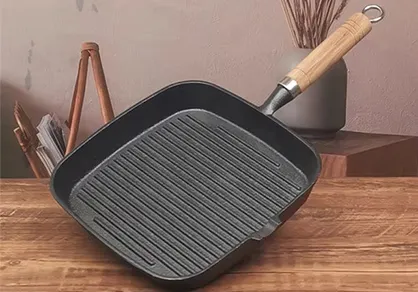
2 月 . 14, 2025 22:39
Back to list
dutch oven what is
A Dutch oven is not just another piece of cookware; it’s a time-honored kitchen essential that embodies culinary tradition, versatility, and reliability, all qualities sought after in modern kitchen equipment. Renowned for its capacity to deliver a wide range of culinary experiences, a Dutch oven's allure isn’t merely in its robust construction but also in its ability to bridge heritage and contemporary culinary practices.
There's an authoritative consensus in culinary circles about the Dutch oven’s efficiency in professional settings. Celebrity chefs and culinary educators lauding its benefits add significant credibility. For instance, prominent chefs have demonstrated the Dutch oven’s use in high-pressure cooking environments, showcasing its ability not just to cook, but to elevate dishes through consistent quality and depth of flavor. The trustworthiness of a Dutch oven is evident through extensive consumer and expert reviews. Those who have incorporated it into their cooking routine often share glowing testimonials about its durability and effectiveness. Users consistently report that, with minimal maintenance, a Dutch oven can last decades, making it a valuable investment for any kitchen. Finally, a consideration for the environmentally conscious cook is the Dutch oven's sustainability. Its longevity in the kitchen means fewer replacements over time, reducing the need for excess manufacturing that affects the environment negatively. Additionally, the ability to pass a well-maintained Dutch oven down through generations speaks to its sustainable value. In conclusion, whether you're a seasoned cook or just beginning your culinary journey, introducing a Dutch oven to your kitchen repertoire offers a remarkable experience of culinary versatility and reliability. Such a multifaceted tool underscores not only a commitment to culinary excellence but also to a tradition of cooking that transcends cultural boundaries. This is why the Dutch oven isn't just another pot; it is an enduring symbol of quality and trust in the global kitchen landscape.


There's an authoritative consensus in culinary circles about the Dutch oven’s efficiency in professional settings. Celebrity chefs and culinary educators lauding its benefits add significant credibility. For instance, prominent chefs have demonstrated the Dutch oven’s use in high-pressure cooking environments, showcasing its ability not just to cook, but to elevate dishes through consistent quality and depth of flavor. The trustworthiness of a Dutch oven is evident through extensive consumer and expert reviews. Those who have incorporated it into their cooking routine often share glowing testimonials about its durability and effectiveness. Users consistently report that, with minimal maintenance, a Dutch oven can last decades, making it a valuable investment for any kitchen. Finally, a consideration for the environmentally conscious cook is the Dutch oven's sustainability. Its longevity in the kitchen means fewer replacements over time, reducing the need for excess manufacturing that affects the environment negatively. Additionally, the ability to pass a well-maintained Dutch oven down through generations speaks to its sustainable value. In conclusion, whether you're a seasoned cook or just beginning your culinary journey, introducing a Dutch oven to your kitchen repertoire offers a remarkable experience of culinary versatility and reliability. Such a multifaceted tool underscores not only a commitment to culinary excellence but also to a tradition of cooking that transcends cultural boundaries. This is why the Dutch oven isn't just another pot; it is an enduring symbol of quality and trust in the global kitchen landscape.
Previous:
Next:
Latest news
-
Extra Large Round Cast Iron Griddle - Heavy Duty Griddle Plate for Even Heating & Versatile CookingNewsJun.10,2025
-
Top Brands of Cast Iron Cookware Durable & Versatile Cast Iron Skillet BrandsNewsJun.10,2025
-
Enamel Coated Cast Iron Pot Durable, Non-Stick & Even Heat CookingNewsMay.30,2025
-
2 Quart Dutch Oven Durable Cast Iron, Even Heating & VersatileNewsMay.30,2025
-
Best Chinese Wok Price Authentic Iron Pans, Fast Shipping & DealsNewsMay.29,2025
-
Non-Stick Cast Iron Skillet with Lid Durable & Easy-Clean PanNewsMay.29,2025


